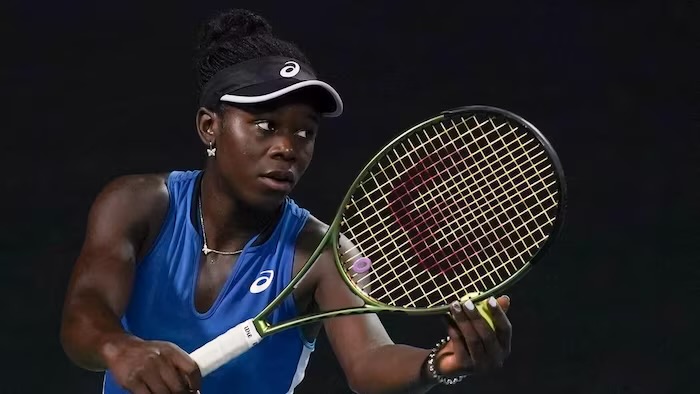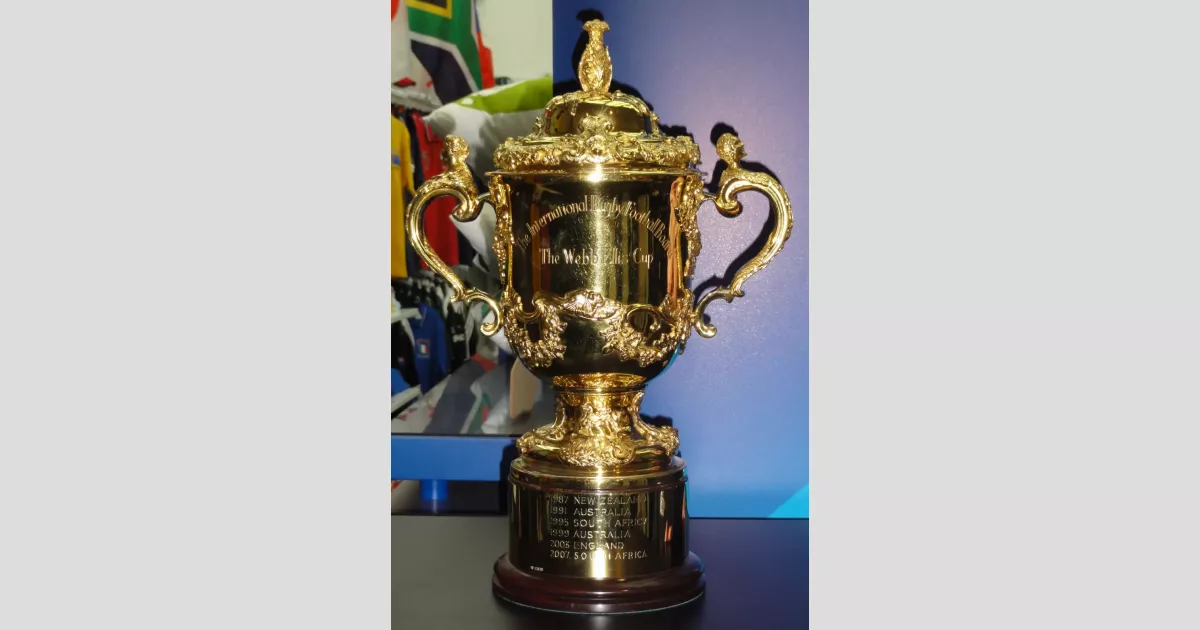1900: Rugby Union at the Olympics
In 1900, rugby union first appeared at the Summer Olympic Games in Paris.
1906: Trophy Creation
In 1906, the Webb Ellis Cup was created by Garrard's Crown Jewellers.
1908: Rugby Union at the Olympics
In 1908, rugby union was played at the Summer Olympic Games in London.
1910: France Joins Home Nations
In 1910, France joined the Home Nations Championship, expanding it to the Five Nations.
1920: Rugby Union at the Olympics
In 1920, rugby union was played at the Summer Olympic Games in Antwerp.
1924: Rugby Union at the Olympics
In 1924, rugby union was played at the Summer Olympic Games in Paris. Rugby union ceased to be on Olympic program after this date.
1983: Australian Rugby Union Proposal
In 1983, the Australian Rugby Union independently proposed the establishment of a world cup.
1984: New Zealand Rugby Union Proposal
In 1984, the New Zealand Rugby Union independently proposed the establishment of a world cup.
1985: IRFB Proposal Passed
In 1985, a proposal to the IRFB passed 10-6 for the establishment of a world cup.
June 1987: Inaugural Tournament
In June 1987, the inaugural Rugby World Cup was held, co-hosted by Australia and New Zealand, with sixteen nations taking part.
1987: Grant Fox's Record
In 1987, New Zealand All Black Grant Fox set the record for most points in a single Rugby World Cup competition, scoring 126 points.
1987: 16 Teams Participate
In 1987, sixteen teams participated in the Rugby World Cup tournament.
1987: Trophy Chosen
In 1987, the Webb Ellis Cup was chosen for use in the competition.
1987: First Rugby World Cup
In 1987, the first Rugby World Cup was held, co-hosted by New Zealand and Australia.
1987: Inaugural Tournament Viewership
In 1987, the inaugural Rugby World Cup tournament had cumulative worldwide television audiences of 300 million.
1991: Jason Leonard's World Cup Appearances
In 1991, Jason Leonard of England began his record-setting World Cup appearances.
1991: 1991 Tournament Viewership
In 1991, the Rugby World Cup tournament had cumulative worldwide television audiences of 1.75 billion.
1991: Japan's Last Win Until 2015
Since 1991, Japan had not won a single World Cup match until 2015.
1992: South Africa Hosts New Zealand
In 1992, eight years after their last official series, South Africa hosted New Zealand in a one-off test match.
1995: Marc Ellis' Record
In 1995, All Black Marc Ellis set the record for most tries in a single match with six tries.
1995: Jonah Lomu's Final Appearance
In 1995, New Zealand's Jonah Lomu became the youngest player to appear in a World Cup final at 20 years and 43 days old.
1995: South Africa Hosts and Wins
In 1995, South Africa hosted the Rugby World Cup and defeated New Zealand in the final, winning the tournament. Nelson Mandela presented the trophy to South Africa's captain, Francois Pienaar.
1995: 16 Teams Participate
In 1995, sixteen teams participated in the Rugby World Cup tournament.
1995: All Blacks Score Record Points
In 1995, the All Blacks set a record by scoring 145 points against Japan.
1995: 1995 Tournament Viewership
In 1995, the Rugby World Cup tournament had cumulative worldwide television audiences of 2.67 billion.
1995: Sport Turns Professional
The sport turned professional after 1995.
1999: Jannie de Beer's Record
In 1999, South Africa's Jannie de Beer kicked five drop-goals against England, setting a single World Cup match record.
1999: Millennium Stadium
In 1999, the Millennium Stadium was built purposely for the tournament.
1999: Expansion to 20 Teams
In 1999, the Rugby World Cup expanded to twenty teams.
1999: 1999 Tournament Viewership
In 1999, the Rugby World Cup tournament had cumulative worldwide television audiences of 3 billion.
1999: Wales Hosts the Tournament
In 1999, the Rugby World Cup tournament was hosted by Wales with matches also being held throughout the rest of the United Kingdom, Ireland and France. The number of participating nations was increased from sixteen to twenty.
1999: Wales Hosts
Wales hosted in 1999.
2003: Australia's Record Winning Margin
In 2003, Australia achieved the widest winning margin of 142 points in a match against Namibia.
2003: Jason Leonard's and Richie McCaw's World Cup Matches
In 2003, Jason Leonard of England played his final World Cup match, tying the record with Richie McCaw of 22 World Cup matches.
2003: 2003 Tournament Viewership
In 2003, the Rugby World Cup tournament had cumulative worldwide television audiences of 3.5 billion.
2003: Qualifying Format
In 2003, the qualifying format allowed eight positions to be automatically filled by the quarter-finalists of the previous tournament, with the remaining positions filled by continental qualifying tournaments.
2003: Lopsided Results
In 2003, there were a number of remarkably lopsided results. Australia's 142–0 win over Namibia stands as the most lopsided score in Rugby World Cup history.
November 2005: New Zealand Awarded Hosting Rights
In November 2005, New Zealand was awarded the 2011 Rugby World Cup tournament, ahead of bids from Japan and South Africa.
2007: Bryan Habana's Record
In 2007, Bryan Habana equaled the record for most tries in a tournament, scoring 8 tries.
2007: South Africa Wins
In 2007, South Africa won their second Rugby World Cup title, defeating England 15-6.
2007: 2007 Tournament Viewership
In 2007, the Rugby World Cup tournament had cumulative worldwide television audiences of 4 billion.
2007: Qualifying Format
In 2007, the qualifying format allowed eight positions to be automatically filled by the quarter-finalists of the previous tournament, with the remaining positions filled by continental qualifying tournaments.
2011: Eden Park Upgraded
In 2011, Eden Park was upgraded for the tournament.
2011: New Zealand Wins
In 2011, New Zealand won the Rugby World Cup, defeating France in the final with a narrow 8-7 victory.
2015: England Eliminated at Pool Stages
In 2015, England became the first solo host nation to be eliminated at the pool stages.
2015: Japan Upsets South Africa
In 2015, Japan defeated South Africa in the opening weekend of the tournament, generating the biggest upset in Rugby World Cup history. New Zealand won the final against Australia.
2015: Julian Savea's Record
In 2015, Julian Savea equaled the record for most tries in a tournament, scoring 8 tries.
2015: Richie McCaw's World Cup Appearances
In 2015, Richie McCaw tied the record for most World Cup appearances.
2015: Gold-Plated Match Ball
In 2015, the World Cup Final was commemorated with a 24-carat gold-plated Rugby World Cup final match ball, made by Web Ellis Cup custodians, Thomas Lyte.
2019: First Non-Traditional Host
In 2019, Japan hosted the Rugby World Cup, the first time the tournament had been held outside the traditional rugby strongholds.
2021: Gender Designations Removed
Starting in 2021, gender designations were removed from the titles of the men's and women's World Cups.
2021: Women's Tournament Renamed
Starting in 2021, the women's equivalent tournament was officially renamed the Rugby World Cup.
2022: Women's Tournament
In 2022, the women's tournament was held in New Zealand, which retained its original title of "Rugby World Cup 2021" despite having been delayed.
2023: 26 Nations Qualified
As of the 2023 World Cup, 26 nations have qualified to compete across 10 tournaments.
2023: Gender Designations Included
At the end of the 2023 World Cup, World Rugby announced that all preceding tournaments would include the words "Men's" or "Women's" in their titles.
2023: South Africa wins 2023 Rugby World Cup
In 2023, South Africa defeated New Zealand in the final to win the tournament and become the current champion.
2023: Will Jordan's Record
In 2023, Will Jordan equaled the record for most tries in a tournament, scoring 8 tries.
2023: Most Viewed Event
In 2023, the tournament achieved 1.33 billion viewing hours across all programming, making it the most viewed rugby event of all time.
2025: First Women's Tournament
In 2025, the first Women's Rugby World Cup will be held with "Women's" included in its title.
2027: Expansion to 24 Teams
In 2027, the Rugby World Cup will expand to twenty-four teams when it is held in Australia.
2027: First Men's Tournament
In 2027, the first Men's Rugby World Cup will be held with "Men's" included in its title.
2031: Tournament in the United States
In 2031, the United States will host the tournament.
Mentioned in this timeline
New Zealand is an island country in the southwestern Pacific...
Africa is the second-largest and second-most populous continent comprising of...
Japan is an East Asian island country located in the...
Australia officially the Commonwealth of Australia encompasses the Australian mainland...
France officially the French Republic is primarily located in Western...
The modern Olympic Games are a leading international sporting event...
Trending

36 minutes ago Victoria Mboko surges into WTA 1000 final after defeating Ostapenko in Doha.

37 minutes ago House Passes SAVE America Act: Senate Battle Looms Over Voting Rights

2 hours ago De Minaur Advances in Rotterdam; ABN AMRO Tournament Prediction; News Announcement Disappoints Fans

2 hours ago Julia Simon wins Gold; German Biathletes Preuss & Voigt Miss Podium at Olympia.
2 hours ago Son's American Idol Audition Makes Country Star Cry; Franklin Resident Joins

3 hours ago Navalny Killed by Russia Using Dart Frog Toxin, UK and Europe Claim.
Popular

Kid Rock born Robert James Ritchie is an American musician...
The Winter Olympic Games a major international multi-sport event held...

Pam Bondi is an American attorney lobbyist and politician currently...

Barack Obama the th U S President - was the...

XXXTentacion born Jahseh Dwayne Ricardo Onfroy was a controversial yet...
Randall Adam Fine is an American politician a Republican who...
